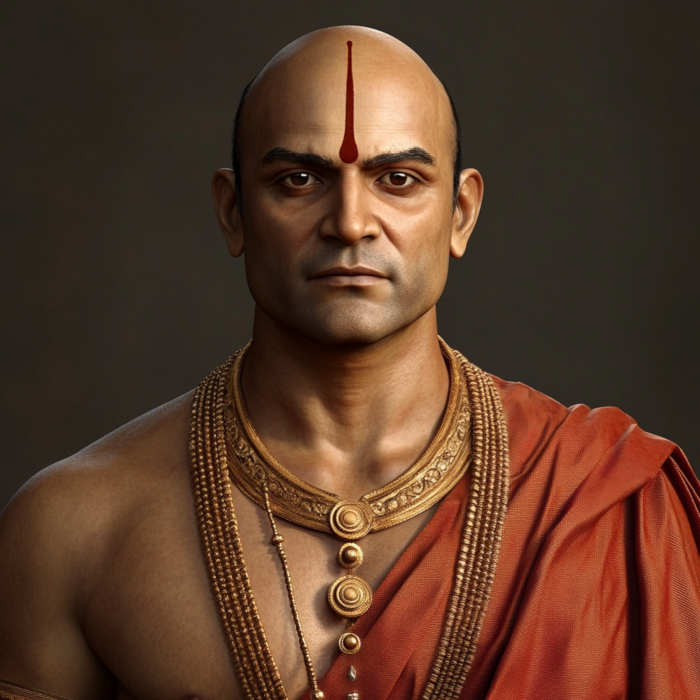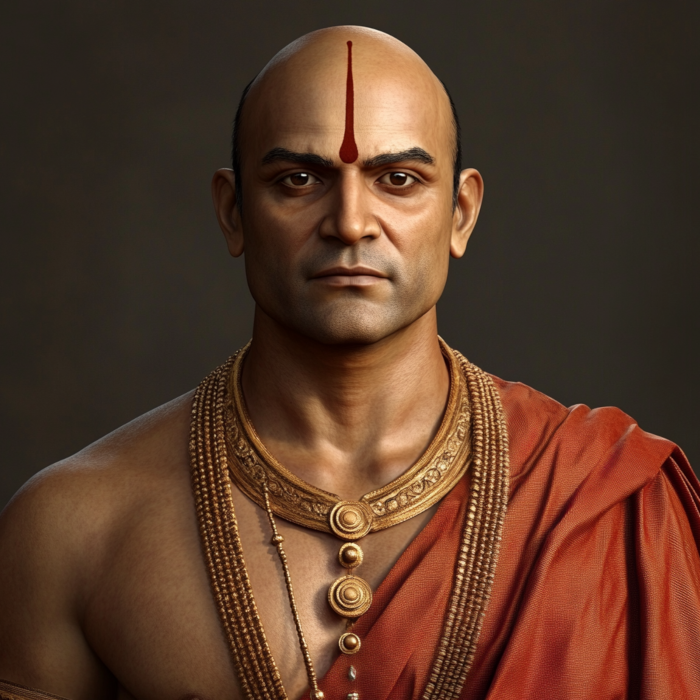


Chanakya (c. 375–283 BCE) was an ancient Indian teacher, philosopher, economist, jurist, and royal advisor. He is traditionally identified as Kautilya or Vishnugupta, the author of the Arthashastra, an ancient Indian political treatise on statecraft, economic policy, and military strategy. Chanakya is often considered one of the earliest thinkers to lay the foundations of political science and economics in India. His ideas and strategies played a crucial role in the establishment of the Maurya Empire, the first great empire in Indian history.
Birth: Chanakya is believed to have been born in the 4th century BCE, though exact details of his birth and early life are largely based on legend. He was born into a Brahmin family in ancient India, possibly in the region that corresponds to modern-day Bihar or Punjab.
Education: Chanakya was a highly educated scholar. He studied at the ancient university of Takshashila (now in Pakistan), which was a major center of learning in ancient India. He was well-versed in various branches of knowledge, including Vedas, politics, economics, philosophy, and warfare.
Meeting with Chandragupta Maurya: According to traditional accounts, Chanakya was a teacher at Takshashila when he encountered Chandragupta Maurya, a young boy of noble but humble origins. Recognizing Chandragupta’s potential, Chanakya took him under his wing and groomed him to become a leader. Together, they formed a plan to overthrow the Nanda dynasty, which was ruling the Magadha kingdom at that time.
Overthrow of the Nanda Dynasty: Chanakya and Chandragupta led a series of military campaigns against the Nanda rulers. After several years of struggle and strategic alliances, they succeeded in overthrowing Dhana Nanda, the last ruler of the Nanda dynasty. This victory marked the beginning of the Maurya Empire, with Chandragupta as its first emperor and Chanakya as his chief advisor.
Advisor to Chandragupta: As Chandragupta's advisor, Chanakya played a key role in consolidating the Maurya Empire, which eventually became one of the largest and most powerful empires in ancient India. His counsel was instrumental in helping Chandragupta expand his empire, manage state affairs, and implement policies that strengthened the administration and economy of the realm.
Authorship and Content: Chanakya is traditionally credited with authoring the Arthashastra, a comprehensive treatise on politics, economics, military strategy, law, and diplomacy. The text is divided into 15 books (Adhikarans) and provides detailed instructions on governance, economic policy, foreign relations, and espionage, among other topics.
Statecraft and Diplomacy: The Arthashastra is perhaps most famous for its pragmatic approach to statecraft. It emphasizes the importance of a strong, centralized state, the use of diplomacy, espionage, and, when necessary, military force to maintain power and order. Chanakya advocated for the idea of realpolitik, suggesting that rulers should be pragmatic and strategic rather than purely ethical or idealistic.
Economics and Administration: The text also contains detailed instructions on economic management, including taxation, trade, agriculture, and the role of the state in regulating the economy. Chanakya emphasized the importance of a prosperous and well-managed economy as the foundation of a strong state.
Moral Philosophy: Although the Arthashastra is often seen as a manual for political pragmatism, it also includes discussions on ethical leadership. Chanakya advocated for the welfare of the people as the ultimate goal of governance, even if it meant employing unconventional or harsh methods to achieve it.
Influence on Indian Thought: Chanakya's ideas have had a profound influence on Indian political thought and philosophy. His emphasis on statecraft, strategic thinking, and economic management has been studied and applied by leaders throughout Indian history.
Modern Interpretations: In modern times, Chanakya is often referred to as the "Indian Machiavelli," though his works predate Niccolò Machiavelli's The Prince by nearly 1800 years. His teachings continue to be relevant in contemporary discussions on politics, economics, and leadership, not just in India but around the world.
Cultural Legacy: Chanakya is a significant figure in Indian culture and history. He is celebrated as a symbol of wisdom and shrewdness in governance. His life and works have been the subject of numerous books, television series, and films in India, reflecting his enduring legacy.
Later Life: After serving as the chief advisor to Chandragupta Maurya, Chanakya continued in his role during the early years of Chandragupta's son, Bindusara. However, details about the end of his life are not well-documented, and various legends offer different accounts of his death.
Death: Chanakya is believed to have died around 283 BCE. Some sources suggest that he may have retired to a life of asceticism, while others claim that he was involved in court intrigues leading to his demise. However, these accounts are largely speculative and not confirmed by historical evidence.
Chanakya remains one of the most significant figures in Indian history, particularly for his contributions to political theory and statecraft. His ideas, particularly those articulated in the Arthashastra, have had a lasting impact on the way governance, economics, and power are understood in India and beyond. Chanakya's blend of practical wisdom, strategic acumen, and deep knowledge continues to be studied and admired by scholars, leaders, and thinkers across the world.

We use cookies
We use cookies and other tracking technologies to improve your browsing experience on our website, to show you personalized content and targeted ads, to analyze our website traffic, and to understand where our visitors are coming from. Privacy Policy.